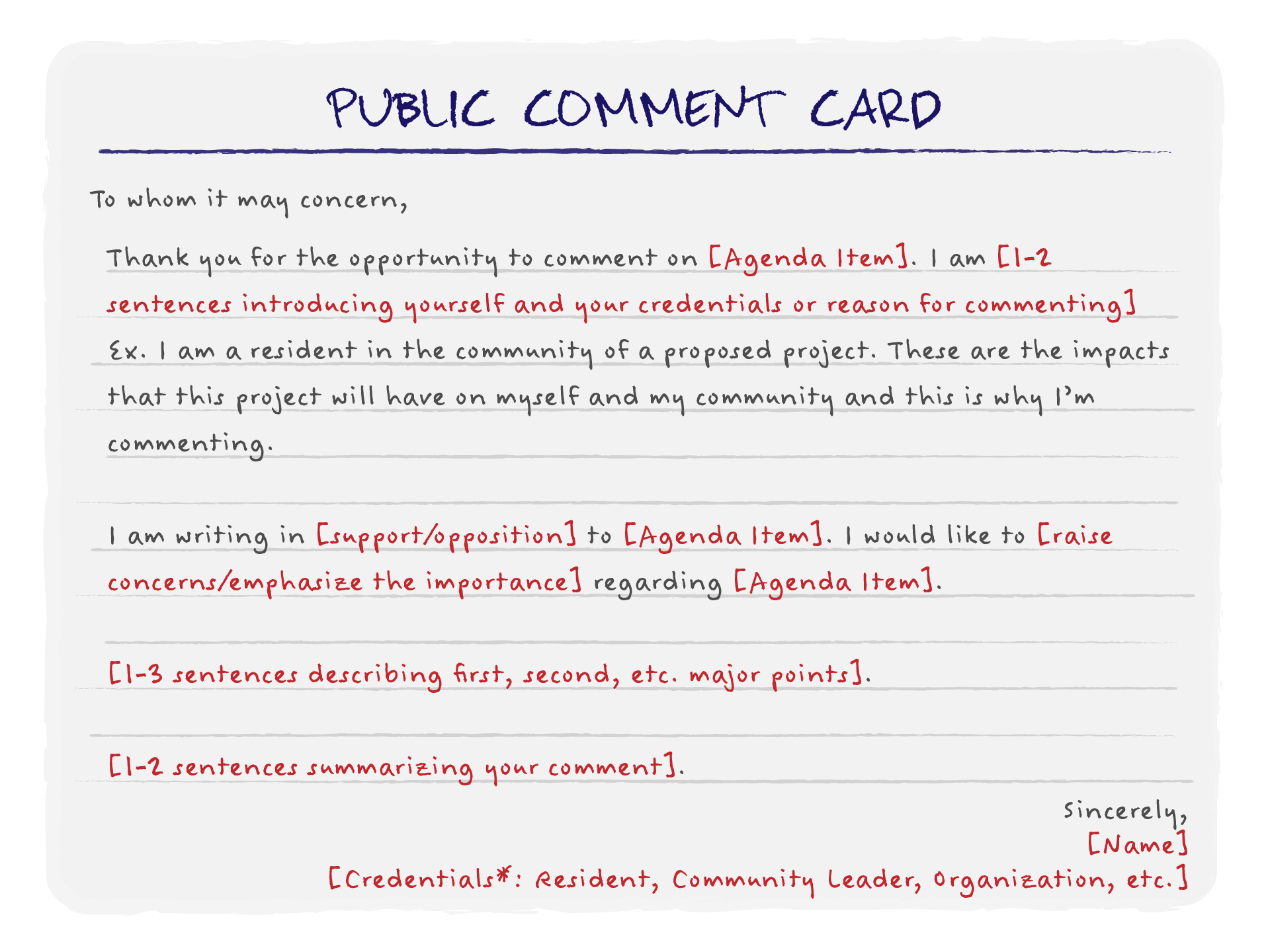Civic Participation at your Local Government
Meetings
Stockton City Council Meeting
There are multiple different types of meetings in government and multiple avenues to advocate for community needs through each type of meeting. You might already be familiar with attending City Council meetings or school board meetings where the avenue for community input is through public comments. Some elected officials also host regular town hall meetings in the communities they serve in order to create accessible spaces for direct dialogue and civic engagement. In addition to these types of meetings, there is always the option of reaching out to your local representatives and requesting individual meetings with them.
The importance of attending any of these meetings is the ability to make a connection with your representative and share compelling stories. Take advantage of the opportunity to have a captive audience listening to your concerns and reading your messages. Sharing your personal connection and explaining the real impacts decisions may have on your life and your community could be all it takes to flip a vote in your favor.
As mentioned above, public comments, whether spoken or written, are one of the incredible tools you can use to participate in meetings. Let’s take a look at how they work and what rights you have to them!
Public Comments
What are Public comments
Public comments are another tool for public input, built into the federal rule-making process. In addition, unlike writing letters or making phone calls where staff members are the ones who typically sort through public messages, public comments can be spoken or read at meetings where elected officials must sit and listen. Public comments are then recorded and become a part of the permanent government record associated with the issue you are commenting on. Public comments are a way to grab attention in a public forum and in some cases, even necessitate a response.
Some boards may try to severely limit public comments. In the following section, you’ll find that most meetings will allow for about a 20 minute public comment session. If you feel that your right to comment is being violated, use these resources to fight back:
When to Give Public Comments
There are a lot of meetings that you have a right to attend and participate in. When you find yourself needing to make a public comment, you can find meeting minutes and agendas for some local committees here:
How to Give Public Comments
Different meetings and boards will have different rules and requirements for making public comments. Some meetings might only allow in person public comments while others may have developed online forms to submit written comments. You can expect to have a time limit of at most 3 minutes to speak or a word limit to meet for written comments. Additionally, public comment sessions vary from 15-20 minutes, although boards always have the option to extend these sessions. Make sure you read and understand the guidelines for the different meetings you want to attend.
To save you some time, here are some of the ways to submit comments for various meetings:
City of Stockton
Join virtually (email city.clerk@stocktonca.gov no later than 90 min prior to the meeting to request a link) e-Comment virtual form or email comments city.clerk@stocktonca.gov
In person, at City Hall 425 N El Dorado, request a speaker card
San Joaquin County Board of Supervisors
Virtual public comment form by the start time of the meeting (250 word limit)
In person, at County Administration Building 44 N San Joaquin St 6th floor
Stockton Unified School District
Email boardmeeting@stocktonusd.net by the start time of the meeting
Include the specific agenda item you are commenting on in the subject line
Lincoln Unified School District
In person, check the Lincoln Unified schedule to find the location of their board meetings
You are also encouraged to message board members directly through email
Lodi Unified School District
In person, check the Lodi Unified schedule to find the location of their board meetings
*COVID protocols previously allowed virtual written comments through this comment form
Manteca Unified School District
Email musdschoolboard@musd.net by the start time of the meeting
San Joaquin Delta College Board Meetings
Email rsadberry@deltacollege.edu by the start time of the meeting
San Joaquin Council of Governments
Virtual participation via teleconference and Zoom meetings found at the SJCOG Agenda Center
San Joaquin Regional Transit District
Email BoardSupport@sjRTD.com or call (209) 467 - 6613
All comments must be received by 9am on the day of the meeting
San Joaquin County Board of Education
Email boardmeetings@sjcoe.net no later than 60 min prior to the meeting
Call (209) 468-4802 no later than 60 min prior to the meeting
Pro-Tip
Make the most of the minutes and words that you get. When you make a public comment, the same tips you’ve been following to call or email officials apply here.
Let them know who you are, why you care, and why they should care.
Public Comment Template
Here’s a template to follow as a guideline and customize:
You can copy & paste this text:
Re: [Agenda Item, Subject]
To Whom It May Concern,
Thank you for the opportunity to comment on [Agenda Item]. I am... 1-2 sentences introducing yourself and your credentials* or reason for commenting. Ex. I am a resident in the community of a proposed project. These are the impacts that this project will have on myself and my community and this is why I’m commenting.
I am writing in [support/opposition] to [Agenda Item]
I would like to... [raise concerns/emphasize the importance] regarding [Agenda Item].
[1 sentence describing first major point]
[1 sentence describing second major point]
etc...
1-2 sentences summarizing your comment. [If you have documents or otherwise to support your points: Please see below for additional details and pertinent literature]
Sincerely,
[Name]
[Credentials*: Resident, Community Leader, Organization, etc.]
*Credentials do not have to be college degrees or years of experience in a profession. In this case, “credentialing” yourself means you have a stake in the decisions being made because you are an affected community member or someone who cares about what is happening.
Committees and Commissions
Another way to participate in local government is to join a city commission, board, committee, or task force. City commissions serve as another avenue for community input and gives people the power to provide insight and recommendations to the City Council about community priorities. These positions are appointed by the City Council, but are open to applications from any resident interested in serving their community.
How Committees and Commissions Should Work
There are different commissions with specific scopes of responsibility. For example, the Arts Commission is responsible for promoting and sponsoring projects to raise public awareness of the arts. The Arts Commissions can also advise the City Council on the artistic and cultural development of the City. There is also a City Council Salary Setting Commission that is responsible for making recommendations on the monthly salary for members of City Council, including the Mayor. Keep in mind that these are not decision-making positions and recommendations are subject to approval or revision by the City Council. However, there is power within being able to advise the Council and submit items to place on meeting agendas as a community member.
City of Stockton Commissions
Ideally, the structure of City Commissions would look something like this: City Manager and/or department directors designate staff liaison(s) to city boards, commissions, and committees.
Staff liaison supports city commissions by:
Informing commissions of changing policies, procedures, and Council goals
Providing background, context, and resources to find information/solutions to a problem
Educating new commission members on their roles and responsibilities
Communicating meeting times and transmitting agendas and reference materials
Commissions advise the Council by:
Welcoming resident input at commission meetings, increasing civic engagement
Working with the staff liaison to submit items to be placed on the Council agenda
Action items should make clear recommendations about who is taking action and what the action will accomplish along with anticipated performance metrics
In this structure, there is healthy and productive collaboration between the staff liaison and commissions to identify solutions and make recommendations to the City Council. Commissions are responsible for researching information on the subject they preside over and the staff liaison is responsible for helping find resources and submit commission recommendations to the council. However, in Stockton, it doesn’t always function so smoothly. City commissions are largely staff-driven and not leveraging the strength and potential of commissioners to facilitate/carry out the work of the committee. This leads to staff pulling double duty and restricts their ability to perform the function well. Commissioners should take initiative to be well-informed of the specific function their committee serves, fully understand the process by which the work is being performed, and commit to leading the conversation in a true partnership with their staff liaison.
What’s Next
Let’s step into local government. Take the time to learn more about how city commissions function and the role of commissioners.
The city of Davis, California has a “Commission Handbook” that expertly outlines the role and function of city boards and commissions here:
You can also join a waiting list for upcoming workshops and trainings that will teach you how to navigate local government processes, like joining a commission:
If you have the knowledge and feel ready, you can find open vacancies on Stockton City Commissions and apply for positions here:
To learn more about the roles and responsibilities of each board and commission, click on the commission to expand the details
Running for Office
Stockton City Hall Building
If you have a commitment to serving your community and the drive to push for change, run for office. It requires a lot of time, dedication, and while it may seem like a colossal task, there are endless resources available to help. Our communities need representatives that can champion for change, so if you feel ready, check out some of these resources:





